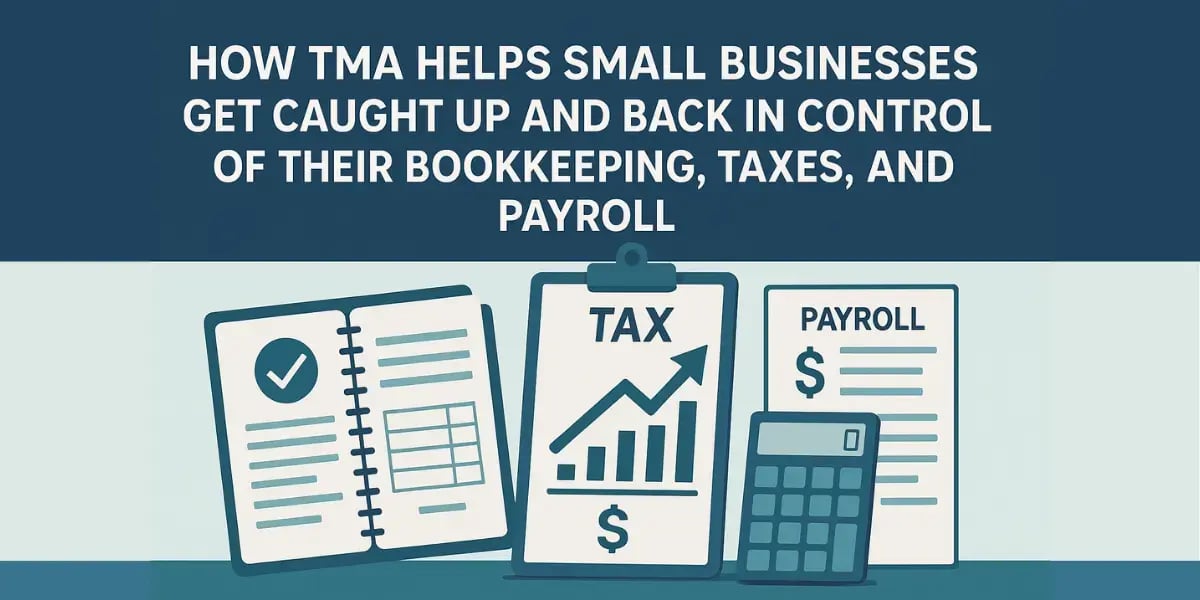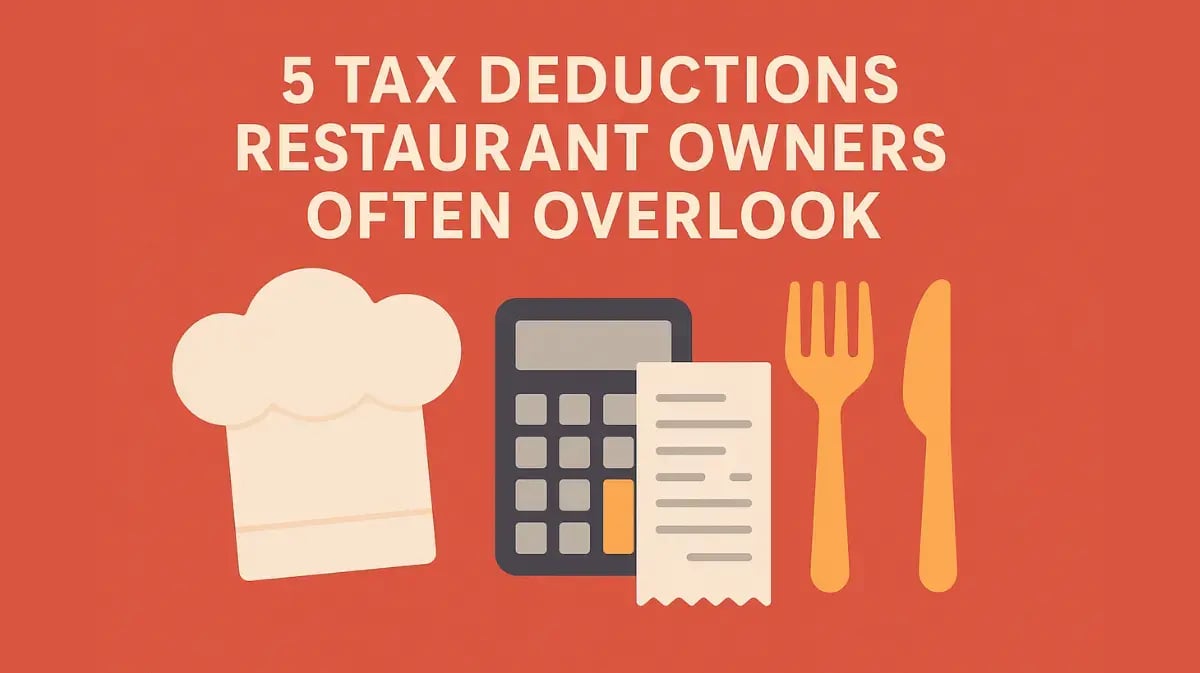How TMA Helps Small Businesses Get Caught Up and Back in Control of Their Bookkeeping, Taxes, and Payroll
October 27th, 2025
6 min read

If you’ve fallen behind on your bookkeeping, payroll, or tax filings, you’re not alone — and you don’t need to feel embarrassed about it.
Staying current with every form, report, and compliance deadline while also running a business is incredibly difficult. Between managing employees, serving customers, and putting out daily fires, it’s easy for the books to take a back seat.
It happens more often than most people think.
At TMA, we see this situation all the time. In fact, most of the businesses we help each month first come to us because they’ve fallen behind to some degree — sometimes by a few months, sometimes by a few years.
When that happens, our team gets to work. We’re tenacious about helping business owners get their financial records cleaned up, caught up, and back in order as quickly and cost-effectively as possible. We don’t judge, and we don’t waste time pointing fingers — we focus on solutions.
That’s what “back work” is all about.
In this article, we’ll explain what back work means, when it’s needed, how much work is involved, and how TMA’s process helps business owners move from feeling overwhelmed to feeling back in control — fast.
What is ‘Back Work’ in Accounting?
“Back work” (sometimes called catch-up bookkeeping or clean-up work) is the process of fixing and updating past-due financial records. It usually includes entering missing transactions, reconciling accounts, correcting errors, and making sure past reporting periods are complete and accurate.
At TMA, we typically handle both back work and current work simultaneously. That way, your past records are being cleaned up while your present-day bookkeeping, payroll, and tax obligations are handled on schedule. You don’t have to wait until the back work is complete to feel caught up.
Think of it like cleaning out a messy garage while still parking your car in the driveway. You’re dealing with the clutter, but your day-to-day needs don’t get put on hold.
At TMA, back work is completed as part of our Implementation Process for new clients. This process is how we get every new business set up for success — from the first strategy meeting, to introducing your service team, to completing the initial catch-up work and reviewing your first set of financial statements together.
While we’ll explore that process in more detail in a companion article, it’s important to know that back work is an essential part of how we implement new clients and bring them fully current.
Reasons Back Work is Needed
If you’ve fallen behind, you’re not alone. In fact, according to a U.S. Bank study, 82% of small businesses fail due to cash flow problems, which directly relates to falling behind on bookkeeping. And, most of our clients come to us with at least some degree of back work needed. Here are the most common reasons:
- Falling behind due to busyness. Owners wear too many hats, and bookkeeping is often the first task pushed to the bottom of the list.
- DIY-ing or an untrained bookkeeper. Many businesses start with a spouse, friend, or part-time staff member handling the books. It works for a while — until mistakes add up or complexity grows.
- Preparing for tax filings. Nothing forces the issue like an upcoming tax deadline. Back work ensures your returns are accurate and timely.
- Meeting bank or lender requirements. Clean financial statements are often required when applying for loans, refinancing, or renewing lines of credit.
- You’re switching accountants. Businesses coming to TMA often need past periods cleaned up before we can set them up on our system.
If any of these sound familiar, you’re exactly the type of business we built our back work process to help.
Back Work: What to Expect
The scope of back work depends on two main factors: how far behind you are, and what types of filings or services are required.
How Much Work is Involved?
The amount of work depends on three things:
- Months behind. Each additional month requires the equivalent of one month of normal accounting work. For example, six months behind typically equals six months of catch-up.
- Transaction volume. A restaurant with hundreds of transactions per week requires more work than a consulting business with a dozen invoices a month.
- Complexity. Businesses with loans, multiple accounts, or detailed reporting needs require more attention than those with straightforward financials.
At TMA, the Back Work Fee (BWF) is typically calculated by multiplying the monthly accounting fee by the number of months that need to be caught up. That means costs are transparent and tied directly to the effort required.
For example, if your monthly accounting fee is $600 and you’re six months behind, the back work fee would generally be around $3,600 (6 × $600).
In cases where the total cost of back work and implementation exceeds $5,000, we may allow installment payments to prevent the cost from becoming a roadblock.
Types of Services Included
Back work isn’t just bookkeeping. It often touches multiple areas of accounting and compliance:
- General bookkeeping: Entering missing transactions, reconciling bank and credit card accounts, correcting ledger balances, and standardizing categories.
- Income tax preparation: Filing any past-due federal or state income tax returns.
- Sales tax compliance: Catching up on missed filings or correcting errors with state revenue departments.
- Payroll tax compliance: Resolving late or inaccurate payroll tax filings and ensuring compliance with federal and state payroll agencies.
Every business has a slightly different mix. That’s why the first step in our process is always to assess the scope before giving a clear plan and price.
Timing and Process at TMA
Back work is performed as part of our Implementation Process — the structured series of activities we follow to onboard new clients successfully. Our goal is to get you current, compliant, and confident as quickly and efficiently as possible.
If you’re behind, you might be envisioning months of chaos before things improve. The truth is, most clients are surprised by how quickly we’re able to bring order to the mess. Because we handle back work and current work concurrently, you’ll start to feel relief almost immediately. Even while we’re cleaning up the past, your present-day books and payroll will begin running smoothly.
Here’s what that process looks like:
- Step 1: Initial discussion – We assess the condition of your books, discuss the expected scope of back work, and estimate the effort required.
- Step 2: Agreement – You’ll receive transparent pricing and a written service agreement. No surprises.
- Step 3: Strategy meetings and onboarding – You’ll meet your TMA service team — your Accounting & Tax Manager, Staff Accountant, and/or Project Accountant. We answer your initial questions about our process, services, and any lingering tax concerns. This is also the time when we will establish a plan and a timeline for getting you back on track.
- Step 4: Catch-up and clean-up – As you become familiar with our team and processes, our accounting staff begins the back work, which includes entering missing transactions, reconciling accounts, correcting errors, and preparing tax returns as needed.
- Step 5: Transition to ongoing services – In most cases, this happens in parallel with the back work, so you’re operating on a current basis right away.
- Step 6: Review meeting and wrap-up – The implementation process concludes when back work is complete and we’ve successfully closed at least one month’s books on time — typically within 30 to 90 days, depending on responsiveness and scope. We finish with a meeting to review your first financial statements and discuss your current-year income tax position.
What You Can Expect During the Process:
- Timeframe: From a few weeks to a few months, depending on scope and complexity.
- Collaboration: We’ll need timely answers to questions and documents from you. Responsive clients move through the process much faster.
- Relief: Because we handle back work and current work concurrently, you’ll feel immediate progress. Even while we’re cleaning up the past, your present-day books and payroll will be running smoothly.
By the end of implementation, you’ll have more than clean books — you’ll have peace of mind, a clear financial picture, and a trusted accounting team that’s ready to help you move forward confidently.
Getting Caught Up Doesn’t Have to Be Overwhelming
Back work isn’t glamorous, but the payoff is huge:
- Peace of mind. No more shoeboxes of receipts or late-night stress before tax deadlines.
- Accurate decision-making. With clean books, you can see whether you’re making or losing money — and why.
- Compliance confidence. Avoid penalties, missed filings, or IRS headaches.
- A strong foundation. Back work lays the groundwork for growth, lending, or even the eventual sale of your business.
- Immediate improvement. Because we usually run current and back work concurrently, you’ll start seeing the benefits of accurate, timely reporting right away — even while we’re still cleaning up the past.
Most importantly, it turns financial confusion into clarity. And that clarity frees you to focus on running your business.
Back work is one of several critical steps in TMA’s comprehensive Implementation Process for new clients. If you’d like to see how we help business owners transition smoothly from “overwhelmed” to “organized,” you can read our companion article, “TMA’s Implementation Process: What New Clients Can Expect.”
Falling behind on your books happens more often than most business owners admit. But being behind doesn’t mean staying behind.
At TMA Accounting, we’ve helped hundreds of small businesses dig out from under the mess and move forward with clarity. Our proven process takes the confusion out of catch-up work, our pricing is straightforward, and our team is here to lift the weight off your shoulders — not add to it.
If your books are overdue, know this: there’s a path forward, and you don’t have to figure it out alone. Let’s clean it up and help you get back to focusing on your business.
Blog Disclaimer: Nothing in this post constitutes legal, tax, or financial advice and is intended for informational and educational purposes only. This informational and educational material is not intended, and must not be taken, as legal, tax, or financial advice on any particular set of facts or circumstances or as recommendations that are suitable for any specific person. You need to contact a lawyer, accountant, or financial adviser licensed in your jurisdiction for advice on your specific questions, issues, and concerns. View our full Terms of Use here.
Topics:




















.webp?width=1200&height=673&name=5%20Common%20Accounting%20Frustrations%20(and%20How%20to%20Find%20a%20Better%20Solution).webp)

